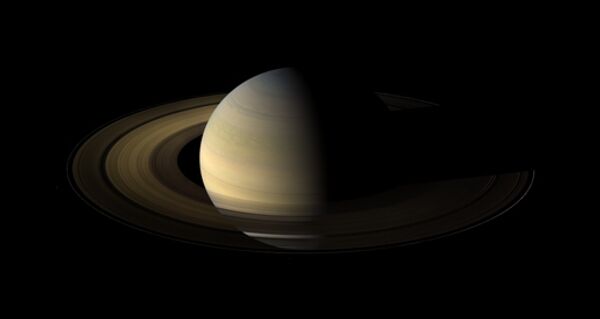NASA scientists have discovered evidences of life on Saturn's moon, Titan.
Analyzed data from NASA's Cassini spacecraft suggest a primitive, exotic form of life or precursor to life on Titan's surface breath with a dense atmosphere around the planet and feed with a complex chemistry on the surface of the moon.
"One key finding comes from a paper online now in the journal Icarus that shows hydrogen molecules flowing down through Titan's atmosphere and disappearing at the surface," NASA website says. "Another paper online now in the Journal of Geophysical Research maps hydrocarbons on the Titan surface and finds a lack of acetylene."
An astrobiologist at NASA Ames Research Center Chris McKay said the lack of acetylene is significant as this chemical would likely be the best energy source for a methane-based life on Titan.
He said that hydrocarbon might be consumed as food adding that the flow of hydrogen is even more critical because all of the proposed mechanisms involved the consumption of hydrogen.
"We suggested hydrogen consumption because it's the obvious gas for life to consume on Titan, similar to the way we consume oxygen on Earth," McKay said. "If these signs do turn out to be a sign of life, it would be doubly exciting because it would represent a second form of life independent from water-based life on Earth."
Scientists say that a temperature on Titan is too low to expect there is water in liquid form on the surface.
"We believe the chemistry is there for life to form," Professor John Zarnecki, of the Open University told the Telegraph website. "It just needs heat and warmth to kick-start the process."
"In four billion years' time, when the Sun swells into a red giant, it could be paradise on Titan," he continued
Both scientists also said that there could be other explanations for the findings.
Currently, methane-based life forms are only a theory as such forms have not been detected anywhere, despite there are liquid-water-based microbes on our planet that multiply on methane or produce it as a waste product.
"These new results are surprising and exciting," said Linda Spilker, Cassini project scientist at NASA's Jet Propulsion Laboratory. "Cassini has many more flybys of Titan that might help us sort out just what is happening at the surface."
MOSCOW, June 5 (RIA Novosti)



